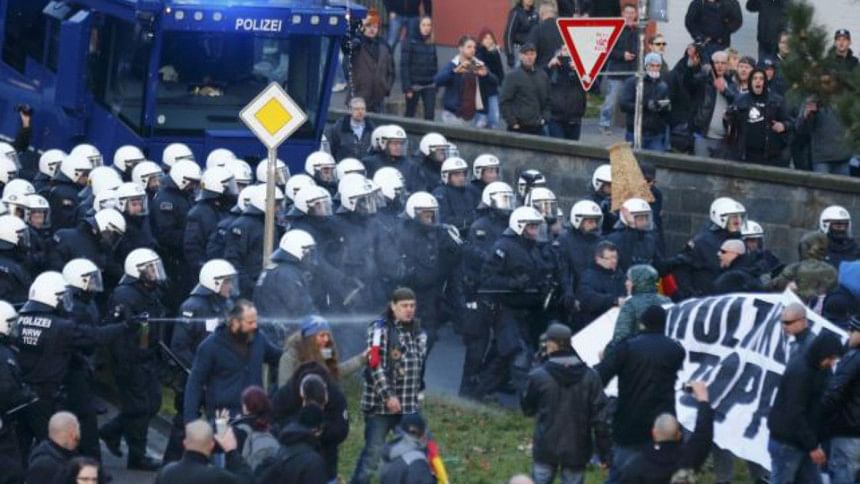Germany's Cologne Test

German Chancellor Angela Merkel seemed all set to regain control of Germany's polarising debate over refugees. In her New Year's Eve address, broadcast with Arabic and English subtitles for the first time, she struck the right note by urging Germans not to be divided and warned of "those who, with coldness or even hatred in their hearts, lay sole claim to be German and seek to exclude others". She also reminded the 1 million plus asylum seekers who arrived in her country last year to respect German rules and traditions.
As Merkel was busy being the conscience of Europe and by extension, the world, about a thousand men, mainly of African, Middle Eastern and Balkan descent, started gathering between Cologne's railway station and cathedral where celebrations were about to begin. Then they set upon the women, groping them, stripping them of clothing and valuables. One woman was raped. Witnesses said they had never seen anything like this in a German city.
The assaults played right into the hands of xenophobes. Thugs roamed the streets attacking foreigners, injuring at least two Pakistanis and a Syrian. According to a survey by INSA, a pollster, more than 60 percent of responders think that there are too many asylum-seekers in Germany while only 29 percent still agree with Merkel's liberal policy. Skeptics are not only on the populist right. A leading feminist said that Germany is "naively importing male violence, sexism and anti-Semitism."
So far Merkel and her coalition parties have responded by talking tough, suggesting that asylum-seekers who commit crimes would be deported. Even the Social Democrats, her centre-left coalition partners, want to crack down hard. Sigmar Gabriel, their party leader, wants offenders to serve their prison time in their home countries to spare German taxpayers. Finland and Sweden have followed suit announcing plans to deport tens of thousands of people in a bid to contain the migrant crisis.
Germany cannot and should not try to deport its way out of this situation. First, it is not clear how many of the attackers can be identified. Second, Germany typically cannot deport criminals with sentences of less than three years; the sexual offences in Cologne mainly fell short of rape, and would carry lighter sentences than that. Earlier this month the interior minister and the justice minister said they would expand the definition of rape and lower the deportation threshold. But the Geneva conventions forbid deporting people to a country where they face persecution. Finally, countries of origin must co-operate; many don't.
Much is still hazy about that night. How could so many people commit such a horrific act together? A prominent study on mob mentality authored by Mina Cikara of Harvard and Adrianna Jenkins of the University of California might shed some light on the issue. The study suggests that being swept up in the excitement of a crowd can make people lose touch with their personal moral code—and in turn, more likely to violate it.
Neither the cultural backgrounds of the male refugees nor the fact that they are traumatised, desperate, and angry can be an excuse for abusing women. By the same token, the criminal acts of a few hundred men are not an excuse for abdicating responsibility in the face of a human tragedy that has engulfed millions.
Many are quick to claim that they were right when they said it was a blunder to open Germany's doors to so many asylum seekers, unfamiliar with its culture. But that's to say that violating women is okay in the countries they came from. Is it really? Among the first list of suspects issued by the federal police were also three Germans and an American. No one has argued that Germans and Americans are savages who do not know how to treat women with respect.
Among the forgotten victims of Cologne are the many migrants who are law-abiding people and who came to Germany seeking safety for themselves and their families. We cannot blame them for trying to find a better life. In their situation, we would do the same. But in no platform or forum a key question is ever asked, as pointed out by Peter Singer, the Australian moral philosopher and Chair Professor of Bioethics at Princeton University: Why should someone who is able to travel to another country have priority over others who are in refugee camps and unable to travel?
The men who assaulted the women in Cologne committed a serious crime and they should feel the full force of the law. "What happened here on New Year's Eve is terrible, but it's a criminal matter," said Claus-Ulrich Proelss, director of Cologne's Refugee Council which coordinates assistant to migrants in the city. "Treating it like a migration issue only creates more problems."
The writer is a member of the editorial team at The Daily Star.

 For all latest news, follow The Daily Star's Google News channel.
For all latest news, follow The Daily Star's Google News channel. 








Comments